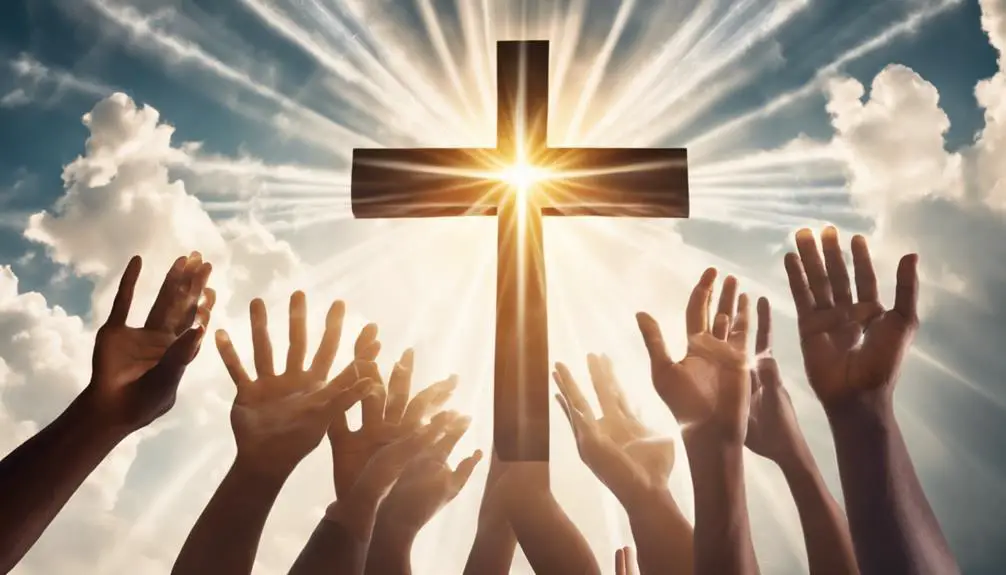Plunge into the biblical depths of 'extol' to unveil its transformative power in worship, sparking a deeper connection with the divine.

Define Extol in the Bible
Exploring the term 'extol' in the Bible is like embarking on a treasure hunt through ancient texts, where each discovery offers deeper insights into spiritual worship and praise. You'll find that 'extol' weaves a rich tapestry across both Old and New Testaments, embodying the act of lifting high with praise.
As you explore its Hebrew and Greek roots, you'll see how it shapes the foundation of Christian worship and permeates biblical examples. But why does this matter to your spiritual journey? Let's uncover the profound impact understanding 'extol' can have on your personal and communal worship practices.
Key Takeaways
- Extol in the Bible often involves songs, prayers, and praises glorifying God's virtues and divine actions.
- Biblical figures like David and Mary use extolling to express reverence, gratitude, and acknowledgment of God's greatness and mercy.
- The act of extolling in the Bible serves both a religious duty and a means to inspire faith and emulation among believers.
- Extolling has shaped Christian worship, emphasizing the creation of hymns and prayers that highlight the magnificence and benevolence of God.
The Etymology of Extol

What's the origin of the word 'extol' that we often encounter in biblical texts? This term, rich in linguistic roots and cultural significance, invites you to delve into its historical backdrop. Originating from the Latin 'extollere', which means to lift up or elevate, 'extol' transcends its literal boundaries to embrace a figurative essence. It's a call to praise or glorify, often used in contexts that underscore the magnification of virtues or divine qualities.
The journey of 'extol' from ancient scripts to its prevalent use in modern languages showcases its enduring relevance. This evolution reflects not just a linguistic transition but a cultural adaptation, where the act of praising has remained a cornerstone of human expression. The reverence encapsulated in 'extol' bridges the temporal with the eternal, offering insights into how ancient cultures viewed divinity and virtue.
Understanding 'extol' through its etymological lens offers you a glimpse into the past, revealing how words shape and are shaped by the cultural and spiritual landscapes they navigate. It underscores the power of language to connect us with our ancestors, inviting a deeper appreciation of the sacred tradition of extolling virtues and divinity.
Extol in Hebrew Context
In exploring the significance of 'extol' within the Hebrew context, it's crucial to understand how this term intertwines with ancient Judaic practices of worship and praise. The act of extolling in Hebrew tradition isn't merely a verbal expression; it's a profound manifestation of reverence and adulation towards the Divine. This reverence is deeply embedded in the fabric of Hebrew culture, showcasing the cultural significance of extolment.
- Hebrew praise techniques are diverse, utilizing songs, prayers, and even dance as mediums to extol. These methods aren't arbitrary but are deeply rooted in scripture and tradition, illustrating a multifaceted approach to worship.
- The use of Psalms in Jewish liturgy as a tool for extolling God highlights the importance of poetic and musical elements in Hebrew worship. This underscores the belief that adoration of the Divine requires a harmonious blend of words and melody.
- Festivals and Holy Days serve as pivotal moments for communal extolling. Events such as Passover and Yom Kippur encapsulate the collective spirit of praise, uniting individuals in a shared act of worship.
- Personal and communal prayers reflect the dual nature of extolling in Hebrew life. While personal prayers offer individuals a moment of intimate connection with God, communal prayers reinforce the collective identity and unity in faith.
Understanding these aspects provides insight into the profound cultural significance and multifaceted nature of extolling within the Hebrew tradition.
Extol in Greek Tradition

Delving into Greek tradition, you'll find that 'extol' carries a rich tapestry of meanings, deeply intertwined with philosophical thought and religious practice. The Greeks, with their elaborate myths and legends, placed a high value on the act of extolling, particularly in the form of hymns and odes dedicated to the Greek pantheon. These expressions of admiration and reverence weren't mere flattery but were seen as essential to the fabric of society, binding the community to the gods and to each other.
The Olympic praises, for instance, weren't only accolades for the victorious but also served as a medium to extol the virtues and the divine favor of the gods themselves. In this context, to extol was to acknowledge the gods' supremacy and benevolence, a practice that fostered a deep communal sense of gratitude and loyalty.
Furthermore, Greek philosophers like Plato and Aristotle also explored the concept of extolling virtues, suggesting that the act of praising noble qualities could inspire others to emulate them. Thus, in Greek tradition, to extol was both a religious duty and a philosophical exercise, aimed at elevating the individual and the collective spirit.
Biblical Examples of Extolling
Turning our attention to the Bible, we'll find numerous instances where figures are extolled for their faith, virtues, and divine favor, reflecting a profound reverence for God's work in the lives of believers. This act of extolling isn't merely about praise but delves deeper into acknowledging and celebrating the divine intervention and guidance in human affairs. Let's explore a few notable examples:
- David's Praises: David, a man after God's own heart, extensively praised the Lord in his psalms. His extolling was a form of worship, recognizing God's sovereignty and mercy. Through his heartfelt psalms, David showcases a model of devout reverence and gratitude.
- Miriam's Song: After the Israelites' miraculous crossing of the Red Sea, Miriam, the prophetess, took a tambourine in hand, leading women in a song of triumph. This song extolled God's mighty power and deliverance, serving as a communal acknowledgment of His saving grace.
- Solomon's Dedication of the Temple: Solomon's prayer and speech during the temple's dedication extensively extolled God's faithfulness and steadfast love towards Israel, highlighting God's unparalleled greatness and benevolence.
- Mary's Magnificat: Mary's song of praise, the Magnificat, extols God for His mercy, strength, and for the fulfillment of His promises. This song encapsulates a deep theological reflection on God's justice and mercy.
The Impact on Christian Worship

Reflecting on these biblical examples of extolling reveals its profound influence on the evolution of Christian worship, guiding believers in their expressions of reverence and adoration. Through the act of extolling, you dive into a tradition rooted deeply in the fabric of faith, shaping praise practices and the very nature of communal and individual worship. This reverent act not only connects you to the historical lineage of believers but also enriches your spiritual journey by emphasizing the importance of vocal and heartfelt praise.
The worship evolution within Christianity is significantly marked by these practices of extolling. As you delve deeper, you'll find that extolling isn't just about the words spoken or sung; it's about embodying a posture of humility and awe before the divine. It encourages a worship experience that transcends the mundane, inviting the sacred into everyday life.
Moreover, the emphasis on extolling within the Bible has inspired the creation of hymns, liturgies, and praise songs that carry the essence of this biblical principle into contemporary Christian worship. It's a reminder that at the heart of worship is the call to acknowledge the greatness of God, shaping how you live out your faith in the world.
Frequently Asked Questions
How Does the Concept of Extolling Differ Across Various Religious Texts Outside of the Bible?
You're exploring how extolling varies across different religious texts, diving into the nuances of cultural interpretations and ritualistic parallels.
This journey uncovers that while the act of extolling is universally recognized as a form of high praise, the context and manner in which it's executed differ significantly.
These variations reflect the unique spiritual landscapes and values of each faith, offering a rich tapestry of reverence that transcends mere words.
Can Extolling Be Considered a Form of Prayer, and if So, How Is It Uniquely Characterized Compared to Other Forms of Prayer?
Yes, you can consider extolling as a form of prayer, uniquely characterized by its emphasis on praise and adoration within prayer dynamics and worship rituals.
Unlike other forms of prayer that might focus on supplication or confession, extolling stands out as a reverent celebration of the divine.
It's a way to express gratitude and honor, deeply embedding a sense of reverence and admiration in your spiritual practice.
What Are the Psychological Effects of Extolling on Individuals and Communities, According to Modern Studies?
When you extol, modern studies show you're not just praising; you're triggering a self-esteem boost in yourself and others. It's a unique psychological phenomenon that fosters community cohesion, creating a stronger, more united group.
This isn't just about feeling good; it's about building a resilient community where members uplift one another. So, in essence, extolling serves as a powerful tool for enhancing individual well-being and reinforcing social bonds.
How Has the Act of Extolling Been Adopted or Adapted in Contemporary Christian Music and Art?
In contemporary Christian music and art, you'll find the act of extolling beautifully woven through lyric analysis and worship trends. It's a mosaic of praise, where the adoration of the divine is reimagined and expressed with profound reverence.
Through scholarly examination, it's evident how these modern expressions have adapted ancient traditions of extolling, enriching the spiritual tapestry with each note and stroke, and connecting communities in a shared act of worship.
Are There Any Notable Historical Figures Outside of Biblical Characters Known for Their Practice of Extolling, and What Impact Did It Have on Their Respective Societies?
You're exploring figures known for their extolling outside biblical narratives, focusing on their rhetorical influence and cultural celebrations. Figures like Socrates, with his philosophical praises, and Shakespeare, through his literary adulations, significantly impacted their societies.
Their practices of extolling not only shaped cultural norms but also left a lasting legacy on intellectual discourse. Analyzing their contributions reveals the profound effect of extolling on societal values and traditions.
Conclusion
In wrapping up, you've traversed the rich tapestry of 'extol' through biblical landscapes, from its etymological roots to its vibrant presence in worship.
Like a lighthouse guiding ships to harbor, extolling in the scriptures illuminates a path of adoration and reverence, urging you to mirror such profound acts of worship.
This exploration not only enriches your understanding but also beckons you to weave these threads of praise into the fabric of your daily life, elevating your spiritual journey.



Sign up